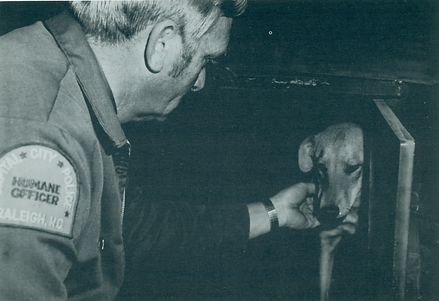
THE HISTORY & LEGACY OF THE
RALEIGH POLICE DEPARTMENT
Animal Control
The Raleigh Police Department has assisted in animal control since its early days. There are mentions of a dog-catcher as early as 1881, though it isn’t clear whether this person was affiliated with the police. The police do make repeated entreaties to Raleigh citizens to purchase tags (or, in the early days ‘badges’) for their dogs beginning in the 1880s. The early tags were not to show a dog had been vaccinated, but rather that taxes had been paid for ownership. By 1900, there is clearly a connection between the police and dog-catching duties. The Chief of Police is given the responsibility of appointing a dog catcher.
In 1938, the Society for the Prevention of Cruelty to Animals founded a branch in Wake County. This group advocated for the addition of a Humane Officer to the Raleigh Police, both to deal with stray animals and to investigate cases of cruelty. This Humane Officer replaced the former position of Dogcatcher. A city ordinance was passed the following year to allow the Chief of Police to employ “one or more humane officers” to work with the SPCA to collect stray dogs and manage them in a local pound.
By 1946, the job had become too large for one person to handle, particularly as the current Humane Officer had been hospitalized. An assistant Humane Officer was appointed, and the position remained. The SPCA advocated for better education for animal owners in the late 1940s, calling for a city-county humane officer to help reduce animal negligence through education.
By 1972, the titles “Humane Officer,” “Animal Control Warden,” “Animal Control Officer” or “Humane Warden” were all used to describe this position. These wardens were now part of the Field Operations division of the RPD, where they would remain until they became part of the Special Operations Division.
_JPG.jpg)





1959
1967
1959-1976
1976-1986
1979
1986-2006
2006
2006-2009
2009-2016
2018-present
The Raleigh Police Department Animal Control Unit was officially formed.
Carl Robert "Bobby" Stell became the first animal control supervisor on February 6, 1967. Animal Control operated under the Services Division.
The unit consisted of six officers and one supervisor. Uniforms consisted of light green shirts and dark brown pants. Animal Control Unit headquarters was located at 301 Hillsborough.
Air conditioning was integrated into Animal Control patrol vehicles. Chow-Chow was a popular breed among dog lovers. Uniforms changed to tan shirts and dark brown pants. Patrol vehicles were green and white. Animal control officers carried snake tongs, a control stick, and a small net to perform their duties.
C.R. Stell retired after 18 years and 11 months of service.
Joe Blomquist was hired as the second animal control supervisor on March 24, 1986. The Computer Aided Dispatch system was introduced. Animal control officers utilized take-home vehicles when on call and were trained for chemical deployment on animals. An animal control officer position was added (9 officers + 1 Supervisor). Tracey A. Alford was hired as an animal control officer in 1989.
Joe Blomquist retired after a little more than 20 years of service. City Council and Retired Chief Jane Perlov [September 17, 2001 – March 2, 2007] planted a green ash tree in his honor at Oakwood Dog Park.
Tracey A. Alford was promoted to animal control supervisor. Animal Control Unit's headquarters was relocated to 1221 Front St. The unit consisted of two squads working rotating shifts. An animal control officer position was added to the unit (10 officers + 1 Supervisor). Ashley N. Staten was hired as an animal control officer in 2009.
Animal control unit investigated and prosecuted the largest felony puppy mill operation in the history of Raleigh Animal Control. Ballistic vests were implemented. Animal control uniforms changed to tan shirts and green pants. Formal training and enhanced equipment were integrated into the unit. National Animal Control Officer Academy training was provided to officers. Humane chemical euthanasia was implemented for sick and injured wildlife.
T.A. Alford retired after almost 30 years of service on December 1, 2018. Ashley N. Staten was hired as Animal Control Supervisor.